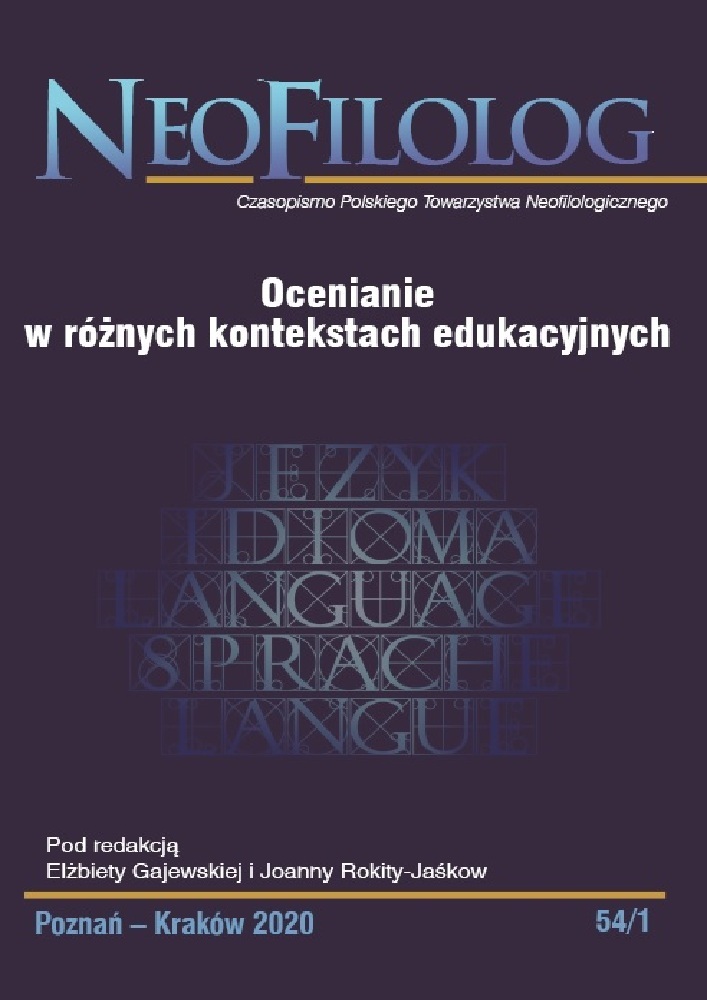Abstrakt
This article deals with the issue of assessment in the context of telecollaborative writing activities conducted on synchronous platforms such as Google Docs. Based on the research conducted by the author among secondary school students learning French, the attempt is made to discuss various areas of participants’ activity which can be subjected to assessment: text planning, text composition, project management through comments, linguistic corrections, etc. A conclusion is reached that the outcome of collaborative writing projects is greatly determined by how L2 students engage in the process of writing using Web-based word processing tools. In our opinion, it is impossible to consider the creation of a universal assessment grid suitable for all teaching contexts. Instead, a teacher willing to integrate such activities in his curriculum has to show a great deal of flexibility and adaptability.
Bibliografia
Abrams Z. (2016), Exploring collaboratively written L2 texts among first-year learners of German in Google Docs. „Computer Assisted Language Learning”, tom 29, nr 8, s. 1259–1270.
Abrams Z. (2019), Collaborative writing and text quality in Google Docs. „Language Learning & Technology”, tom 23, nr 2, s. 22–42.
Bradley L., Lindström B., Rystedt H. (2010), Rationalities of collaboration for language learning on a wiki. „ReCALL”, tom 22, nr 2, s. 247–265.
Chao Y., Lo H. (2011), Students’ perceptions of wiki-based collaborative writing for learners of English as a foreign language. „Interactive Learning Environments”, tom 19, nr 4, s. 395–411.
Elola I., Oskoz A. (2010), Collaborative writing: Fostering foreign language development and mastery of writing conventions. „Language Learning & Technology”, tom 14, nr 3, s. 51–71.
Hsieh Y.C. (2019), Learner interactions in face-to-face collaborative writing with the support of online resources. „ReCALL”, tom 32, nr 1, s. 85–105.
Hu G. (2019), Culture and Peer Feedback, (w:) Hyland K., Hyland F. (red.), Feedback in Second Language Writing: Contexts and Issues. Cambridge: Cambridge University Press, s. 45–63.
Kessler G. (2010), Developing collaborative autonomous language learning abilities in computer mediated language learning: Attention to meaning among students in wiki space. „Computer Assisted Language Learning”, tom 23, nr 1, s. 41–58.
Kessler G., Bikowski D., Boggs J. (2012), Collaborative writing among secondo language learners in academic web-based projects. „Language Learning & Technology”, tom 16, nr 1, s. 91–109.
Kotuła K. (2016a), Creating Texts Together — Collaborative Writing in Polish Secondary School, (w:) Chodkiewicz H., Steinbrich P., Krzemińska-Adamek M. (red.), Working with Text and Around Text in Foreign Language Environments. Zurych: Springer, s. 159–172.
Kotuła K. (2016b), Une première expérience d’écriture collaborative – Enjeux et défis de co-création des tertes selon la perspective des membre sd’un groupe nouvellement constitué. „Alsic – Apprentissage des langues et systèmes d’information et de communication”, tom 19, nr 2. Online: https://alsic.revues.org/2957). [DW 11.07.2019].
Kotuła K. (2017), Strategie współtworzenia tekstów w procesie glottodydaktycznym. „Lingwistyka Stosowana”, tom 23, nr 3, s. 119–133.
Krajka J. (2011), Nauczanie sprawności pisania w środowisku elektronicznym – od procesora tekstu do wiki, (w:) Pawlak M., Wolski B. (red.), Wykorzystanie nowoczesnych technologii w dydaktyce języków obcych. Konin: Wydawnictwo PWSZ w Koninie, s. 31–46.
Krajka J., Maciaszczyk S. (2012), Kształtowanie świadomości nauczycieli w dyskursie internetowym – media społecznościowe w nauczaniu języków obcych. „Neofilolog”, tom 38, nr 2, s. 243–261.
Kuiken F., Vedder I. (2002), Collaborative writing in L2: The effect of group interaction on text quality, (w:) Ransdell S., Barbier M. (red.), New directions for research in L2 writing. Dordrecht: Springer, s. 169–188.
Li M., Zhu W. (2013), Patterns of computer-mediated interaction in EFL collaborative writing groups Rusing wikis. „Computer Assisted Language Learning”, tom 26, nr 1, s. 61–82.
Li M., Zhu W. (2017), Explaining dynamic interactions in wiki-based collaborative writing. „Language Learning & Technology”, tom 21, nr 2, s. 96–120.
Lowry P., Curtis A., Lowry M. (2004), Building a taxonomy and nomenclature of collaborative writing to improve interdisciplinary research and practice. „Journal of Business Communication”, tom 41 nr 1, s. 66–99.
Mak B., Coniam D. (2008), Using wikis to enhance and develop writing skills among secondary school students in Hong Kong. „System”, tom 36, nr 3, s. 437–455.
Shehadeh A. (2011), Effects and students’ perceptions of collaborative writing in L2. „Journal of Second Language Writing”, tom 20, nr 4, s. 286–305.
Storch N. (2002), Patterns of interaction in ESL pair work, „Language Learning”, tom 52, nr 1, s. 119–158.
Storch N. (2005), Collaborative writing: Product, process, and students’ reflections, „Journal of Second Language Writing”, tom 14, nr 3, s. 153–173.
Storch N., Wigglesworth G. (2007), Writing tasks: The effect of collaboration, (w:) García Mayo M. P. (red.), Investigating tasks in foreign language learning. Clevedon: Multilingual Matters, s. 157–177.
Strobl C. (2014), Affordances of Web 2.0 Technologies for Collaborative Advanced Writing in a Foreign Language. „CALICO Journal”, tom 31, nr 1, s. 1–18.
Licencja
Prawa autorskie (c) 2020 Krzysztof Kotuła

Utwór dostępny jest na licencji Creative Commons Uznanie autorstwa – Bez utworów zależnych 4.0 Międzynarodowe.
Przedstawiany utwór (artykuł) upubliczniany jest na podstawie umowy z autorem i na licencji Creative Commons Attribution-NoDerivatives 4.0 International (CC BY-ND 4.0).
Użytkownicy mają obowiązek podania wraz z rozpowszechnionym utworem, informacji o autorstwie, tytule, źródle (odnośniki do oryginalnego utworu, DOI) oraz samej licencji;
- bez tworzenia utworów zależnych,
- utwór musi być zachowany w oryginalnej postaci.
Uniwersytet im. Adama Mickiewicza w Poznaniu zachowuje prawo do czasopisma jako całości (układ, forma graficzna, tytuł, projekt okładki, logo itp.).

